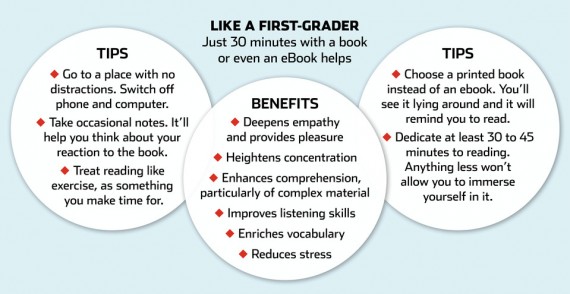Reading is Apparently Good For You
Dedicated reading improves our brains and our health---unless it's on a computer screen.
Dedicated reading improves our brains and our health—unless it’s on a computer screen.
WSJ (“Read Slowly to Benefit Your Brain and Cut Stress“):
Slow reading advocates seek a return to the focused reading habits of years gone by, before Google, smartphones and social media started fracturing our time and attention spans. Many of its advocates say they embraced the concept after realizing they couldn’t make it through a book anymore.
[…]
Slow readers list numerous benefits to a regular reading habit, saying it improves their ability to concentrate, reduces stress levels and deepens their ability to think, listen and empathize. The movement echoes a resurgence in other old-fashioned, time-consuming pursuits that offset the ever-faster pace of life, such as cooking the “slow-food” way or knitting by hand.
The benefits of reading from an early age through late adulthood have been documented by researchers. A study of 300 elderly people published by the journal Neurology last year showed that regular engagement in mentally challenging activities, including reading, slowed rates of memory loss in participants’ later years.
A study published last year in Science showed that reading literary fiction helps people understand others’ mental states and beliefs, a crucial skill in building relationships. A piece of research published in Developmental Psychology in 1997 showed first-grade reading ability was closely linked to 11th grade academic achievements.
Yet reading habits have declined in recent years. In a survey this year, about 76% of Americans 18 and older said they read at least one book in the past year, down from 79% in 2011, according to the Pew Research Center.
[…]
Screens have changed our reading patterns from the linear, left-to-right sequence of years past to a wild skimming and skipping pattern as we hunt for important words and information.
One 2006 study of the eye movements of 232 people looking at Web pages found they read in an “F” pattern, scanning all the way across the top line of text but only halfway across the next few lines, eventually sliding their eyes down the left side of the page in a vertical movement toward the bottom.
None of this is good for our ability to comprehend deeply, scientists say. Reading text punctuated with links leads to weaker comprehension than reading plain text, several studies have shown. A 2007 study involving 100 people found that a multimedia presentation mixing words, sounds and moving pictures resulted in lower comprehension than reading plain text did.
Slow reading means a return to a continuous, linear pattern, in a quiet environment free of distractions. Advocates recommend setting aside at least 30 to 45 minutes in a comfortable chair far from cellphones and computers. Some suggest scheduling time like an exercise session. Many recommend taking occasional notes to deepen engagement with the text.
While I read several hours most days, I mostly do so on a computer screen of some sort and, yes, that has led to to read more quickly, skimming for the key points, rather than slowing down to engage with the text. How much of that is the form of the text itself and how much is the fact that it has coincided with blogging and therefore finding something to share with readers and comment upon, I can’t say.
I have been trying to force myself to read more books, although mostly nonfiction related at least loosely to my work. I seldom take notes, although I do tend to underline and otherwise annotate using a mechanical pencil. Occasionally, though, that engagement will send me to the PC or my iPad or iPhone to answer a question triggered by the text.







It isn’t the medium (screen vs. paper). It is what we are reading. I’m reasonably confident that there is no functional difference between reading a paper book and the same book on a kindle.
@SKI: There’s some question about that, actually. But most of what we read on screens has hyperlinks and other things which tend to distract.
@James Joyner: That is my point. The issue isn’t the medium but the content/structure. Long form vs. blog/tweet/link-fest/etc.
I found myself doing the same kind of skim-reading in law school scanning case summaries/keynotes – back when they were on paper. It is the structure and content and purpose of the reading that is different, not the medium it is read from.
I used to read a lot more than I do now. Getting lazy I guess. I don’t read much fiction any more either (when I do, it is pure escapist trash). Mostly non-fiction on whatever subject interests me at the moment and yeah, I underline too. Note taking should be better tho and help with retention. Something to think about.
I still read lots of fiction for fun, but now do the serious reading on the computer, except for history books (and work related stuff). Most non-fiction authors could cut their books in half or more and it gets tedious reading points they have already made.
Steve
I wonder if screen includes the Kindle. Because of age I primarily read on a Kindle because I can increase the font size.
@SKI: There are questions about that:
. . .
Readers absorb less on Kindles
@OzarkHillbilly:
“I used to read a lot more than I do now. Getting lazy I guess.”
I used to read more serious stuff than I do now (often classic novels and serious history). Nowadays I often re-read lighter fiction (though I will read new books from a few authors whose series I have been reading). I blame it on the kids, as I used to have more time in the morning before I needed to push them to be ready in the morning, and I rarely get on the computer until after they go to bed, so I need to use it then.
@Moosebreath:
Funny, it’s the opposite for me. I think it might be the reality that my window of time here on this planet is fast shrinking, but I really haven’t thought about it much.
Slow reading vs. fast reading. Depends on how well the material is written. There are authors whose works are like savoring a fine Scotch and it would be heresy to go faster. Read the Anthony Villiars novels by Alexei Panshin for an example. Then there are those who generate potboilers and you end up skimming because otherwise it’s terribly tedious (Dan Brown, Tom Clancy.) Then there are writers whose writing is so bad you end up slowing down again to savor the pure awfulness of it (Dan Brown, Barbara Cartland).
I find myself having to slow down for a lot of non-fiction but that’s because it’s got equations in it and I have a pad of paper and pen on the side to check the calculations.
@PD Shaw:
Except that on all measures but one, there was no noticeable statistical difference. I use the word “noticeable” instead of “significant” as that has largely lost its correct meaning in popular discussions of results. Whenever one measure shows this kind of behavior, yet it should plausibly be linked to the others, it is more sound to assume that the null hypothesis is more likely correct. Further study to examine any possible reason for the differing results might be appropriate, but this study “proves” nothing. Both this study and the one it references use individual judgement and multiple end points in scoring the results, and it’s difficult to determine if there were systemic problems from the descriptions. This kind of study often has a problem with experimental rigor and the smart money would be on the effect disappearing as more tightly focused studies are done. Reporting like this supports pre-existing beliefs more than it clarifies the real situation.
@OzarkHillbilly:
“I think it might be the reality that my window of time here on this planet is fast shrinking, but I really haven’t thought about it much.”
I’ll probably get to that point again once the kids are sufficiently independent, but that’s likely not until they are in high school.
@PD Shaw: from that link:
With that type of sample size and one-time study, I wouldn’t place much credence in a single outlier point absent being able to replicate it numerous times.
I do have a problem with the dissing of Kindle. I can and do take notes which I do and it is easy. Simply highlight the text and you can reference it later. I have 2 Kindles because I read so much I can have one charging while I read the other. I have both a paper white and an HDX which is like a small tablet. I prefer the paper white since it lasts a long time between charges and charges very fast but they are synced so when I go back and forth I am at the same place. That also includes the Kindle App on my PC which I use when when doing book reviews because I can copy and paste. As I said earlier I don’t think I could read as much without the increased font size of the Kindle.
I read as often as I can. Between work and parent responsibilities I have less time to read Han I used to but I always have at least one book I’m reading. Before I got a Kindle I used to have at least two books going-one in the car for when I was waiting for kids or in waiting rooms and one I was reading at home. Now I just carry my Kindle in my purse.
I would rather read than watch TV and am more likely to be found readin in the evening than watching something.
The kind of reading I do online is different from my book-reading. Online, I read technical writing for work, as well as more spontaneous reading (journalism, opinion pieces, specific research). Offline, I do technical reading for pleasure, and spiritual reading. I know that I’ve lost my “sea legs” for reading fiction books, and it’s partly because of the internet. If I’m reading for idle pleasure, I’d rather be videogaming. More immediate satisfaction. As for TV, well, I have one, but I’m not sure I’d bother replacing it if it broke.
@SKI:
The only research I’ve seen on reading paper books vs ebooks was for dyslexics. The research there showed ebooks to be better for them primarily because the text size could be manipulated to have only 4-5 words per line. Their reading comprehension went up significantly with that change.
On the Writer’s Almanac today, Garrison Keillor announced that it was William Carlos Williams’ birthday.
I don’t have WCW on my shelves anymore, and realized I didn’t want to read poetry in e-book form. Nor playwrights.
No good reason. I just don’t want to.
Po’ li’l schizo me.
Oh and my online reading tends to be news, blogs and articles that interest me.
My offline reading varies but at the moment mostly leans toward lighter fiction most mysteries, suspense and the occasional YA novel (my daughter and I years ago started reading books together-we read the same book independently and then talk about them-a sort of mother/daughter book club so we tend to read more stuff that appeals to her).
Most of the non fiction I read usually deals with how to parent kids with autism, dealing with IEPs or similar. I think the last non fiction book I read that wasn’t focused on disabilities was the Bobby Orr book.
Paper, please. I like the interface.
@Just Me: That’s a cool bonding exercise.
Over the past few years I’ve been trying to make up for a couple decades of non-reading by picking up a bunch of classics. I’ve enjoyed most of it, although it took me a while to get used to the type of English used by Charles Dickens. (That’s what I get for not reading books for so long.)
@Franklin:
That’s the kind of language you get when someone is paid by the word. On the bright side it does help one go to sleep.
@Grewgills: Indeed!
On another note, consistently over 30 or 40 years, research on reading has noted that the content was not as significant as the volume in overall beneficial effects of reading. More is what is better, the what just doesn’t seem as important.
@Just ‘nutha’ ig’rant cracker: That may be true for physical and psychological effects, but not for the intellectual effects. Renowned jurist John Roberts (let’s leave politics out of this for a minute – he’s a highly-regarded legal writer) says that the best thing a person can do to improve his legal writing is to read well-written things. Most legal opinions are so poorly written that a law student leaves school with a stack of bad writing in his head. Roberts recommends reading anything that’s well-written, legal or otherwise.
@Janis Gore:
It is and its a great way to encourage reading for fun after kids get past the age where they need or really want to be read to. It also makes car rides and dinner conversations easy.